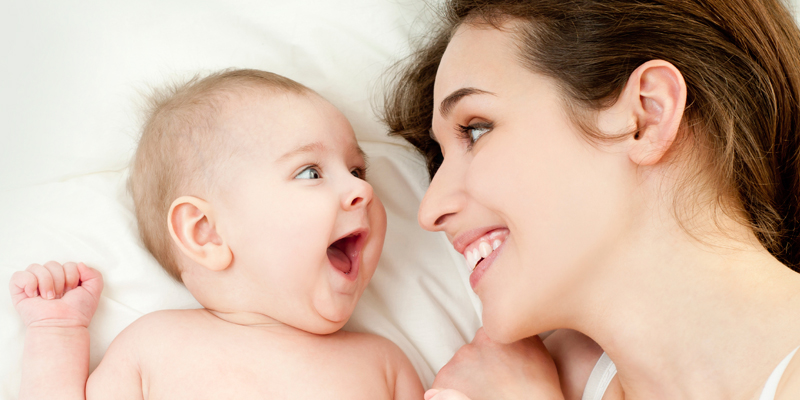
Your Baby’s First Words: How To Help Her Say “Mama” and “Dada”
As you have probably noticed, even before babies can physically speak his first words, they understand the meaning of many words. At 6-9 months of age, you may notice an interesting shift take place, as your baby changes her gaze from your eyes to your mouth while you are speaking. This happens as children become more aware of how communication works. Watching your mouth as you speak allows your baby to see how your speech sounds are formed with your mouth, enabling her to imitate you as best she can.1
She is also becoming more interested in communicating with you through her growing Expressive Language skills. You will likely find your infant eager to “talk” with you during this stage. She may point out something interesting or make sounds to draw your attention to objects she wants. She may reach out for you and even start babbling “up.” She will also start saying a string of vowels, further practicing her speaking skills. You can support your baby’s efforts by facing her and speaking clearly. This lets her see your mouth in action, creating speech by combining both sound and movement. And don’t forget to read to her at every opportunity!
At this age, your baby will also start saying those two most exciting early first words: “mama” and “dada.” While she may not always use these words correctly, she understands that they are two very important words indeed! (In addition to the words being associated with babies’ most important caregivers, research has shown that the ability to understand and produce repeating syllables may come more naturally to humans.2). As your baby continues to hear these common words used in everyday life, she will very quickly start to use “mama” and “dada” in addressing the parents she loves.
(SPECIAL OFFER: Sign up for Playful Bee’s Bee Well developmental learning program to give your baby the best start in life. The first 10,000 children enroll for FREE! Sign up today.)
Play Tips:
Do you want to know how you can support your baby’s development of these Expressive Language skills at this age? It’s easy! Read on for some simple tips to incorporate into your daily play time together.
- Pronounce your words clearly. Every time you have a chat with your baby or describe what you’re doing, be sure to enunciate each part of the word. Even if she has already mastered the babbling of consonants (such as “m,” “b,” and “d”), it is good for her to hear and see you say vowels clearly so that she can follow your lead.
- Promote conversation throughout the day. Focus your conversations on what you are doing together and point out interesting objects in your baby’s daily routine. Repeat words, sounds, and phrases to help build her vocabulary over time.
- Use your “mommy” and “daddy” names whenever possible. To boost your baby’s understanding of who “mama” and “dada” are, use these names whenever you address your partner as well as when you mention yourself. This will encourage her to use these names correctly in the future.
Developmental Milestones:
Has your baby achieved the following Expressive Language developmental milestones yet? If yes, check off all the skill(s) he has already mastered to date using Playful Bee’s developmental milestones tracker. It’s absolutely FREE and easy to use, just click HERE!
- Says “mama” and “dada” to parents (unspecific).
- Babbles a string of vowels (e.g. “ah,” “eh,” and “oh”).
(SPECIAL OFFER: Sign up for Playful Bee’s Bee Well developmental learning program to give your baby the best start in life. The first 10,000 children enroll for FREE! Sign up today.)
Sources:
1Neergaard, Lauran (2012). Babies Learn to Talk by Reading Lips, New Research Suggests. Huffington Post. Retrieved December 15, 2013 from http://www.huffingtonpost.com/2012/01/16/babies-learning-to-talk_n_1209219.html.
2Life’s Little Mysteries Staff (2012). Why Are “Mama” and “Dada” a Baby’s First Words? Live Science. Retrieved December 15, 2013 from http://www.livescience.com/32191-why-are-mama-and-dada-a-babys-first-words.html.
Playful Bee
Latest posts by Playful Bee (see all)
- Have a Super Fortune Cookie Friday! - February 9, 2018
- All Kinds of Shapes: Your Child Is Learning Simple Shapes, and Drawing Them Too! - November 13, 2017
- Fishing for Sneakers: Create your own Hand-Eye Coordination Fun - November 11, 2017

+ There are no comments
Add yours